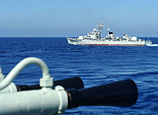
LONDON, Feb. 4 (Xinhua) -- A new economic report by Chinese and Western economists published by a leading British think-tank on Monday argues that China can look forward to a period of stability that runs counter to the gloomy predictions of some Western economists.
The National Institute for Economic and Social Research (NIESR) in London published a special issue of its 'Review' devoted to the Chinese economy.
Five articles looked at the drivers of China's growth, the integration of its financial markets with those of the rest of the world, inflationary pressures, the housing market, and cost competitiveness and productivity trends across China's regions.
The five reports in the review have been written by a team of Chinese and Western economists.
The report argues that while China undoubtedly faces challenges, it faces them from a position of strength relative to earlier periods in its history.
The burgeoning middle-classes offer new opportunities to China's producers, sending them up the value chain to produce goods and services that an ever-more sophisticated consumer base demands.
This can only be good news for China, the report argues, but warns that wage inflation must be kept in check, while the demands of workers for better working and living conditions are met.
"It is phenomenally difficult for Western economists and observers to gain insights into what goes on in the Chinese economy because China has achieved a level of economic growth that is unprecedented in world history," Alex Bryson, principal research fellow at NIESR and editor of the review, told Xinhua.
China has fundamentally different institutions to those in the West, Bryson said, and it takes some time to understand them and how they might respond to crises.
Continued critical evaluations of the Chinese economy may have come unstuck because the writers and the models they use to interpret the economy misunderstand the nature of the Chinese economy.
"We have in the West a false perception of China being a very centralized government with authoritarian rule from the center. In fact, economically, and politically to some extent, it is a very devolved political economy and both the political futures of its leaders and the success of its economic experiments begin at a very local level in cities and states ... ," Bryson explained.
"So what we get is a crucible of experimentation the likes of which we do not see in the West," he said, adding "The West could learn a lot from that. It implies a certain amount of trust or preparedness on the part of the center."
Bryson points to the evidence of the five reports in the review.
China is seemingly paradoxical in achieving such growth with what appear to be weak institutions. However, the review argues China has engineered incentives for growth and productivity, albeit in an unorthodox fashion, which have delivered very substantial economic benefits.
China's impact on the global economy is so large that its development is hard to comprehend within the confines of models which have traditionally examined countries which are much smaller and, if larger, less open to the international economy.
Questions are frequently raised about the sustainability of China's growth trajectory. The review points to the importance of one-off hikes in productivity arising from various experiments China has undertaken with respect to capital restructuring and labor market reform.
But these one-off episodes appear to happen quite regularly, though China must achieve technological progress to make the productivity improvements needed to sustain its growth.
Bryson highlights the success of special economic zones, which from the early 1980s attracted foreign direct investment that allowed China to absorb a "very substantial amount of foreign investment."
"That was an experiment that was allowed by the center but given devolutionary responsibilities at local level," said Bryson.
There remain big challenges to the Chinese economy, including the speed at which the Chinese economy develops.
"It is not surprising from the West that we would regard China as a monolithic entity, but for those who know China know very much that a lot of the traditional and innovative market growth has come from the coastal regions," said Bryson.
"The question for the sustainable development of China is the ability of the interior to match that rate of growth, and this has been crucial," he added.
Coastal provinces have traditionally relied on migrant labor from the interior, driven by poor work options there.
However, this is changing, said Bryson, because of the convergence in the competitiveness of China's regions which is "partly associated with an improvement of the productivity in the interior but also with a relative improvement in the labor costs of those areas."
This lessens the chances of a two-speed China, with the interior regions lagging behind the coastal regions. "That would lead to social unrest and industrial disputes," said Bryson.
It is the sort of development which would underpin sustainable growth across the whole of China, Bryson said.
















 High-profile divorce saga ends
High-profile divorce saga ends


![]()
